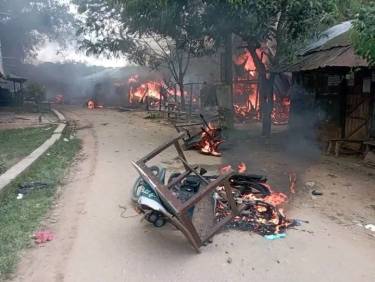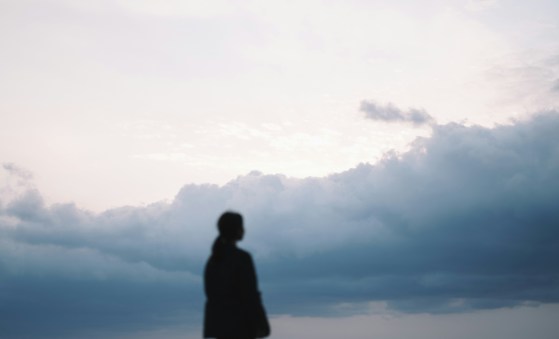
At least three indigenous people were killed and more than 16 others injured during violent clashes in Bangladesh’s southeastern Khagrachhari district on Sunday, 28 September, as protests erupted over the alleged gang rape of a 12-year-old schoolgirl from the Marma community.
Police on Monday confirmed three people were killed in Guimara subdistrict. The indigenous student group Jumma Chhatra Janata (JCJ) identified them as Thowaichhing Marma (25), Akhra Marma (24), and Athuipru Marma (26), all residents of Hafchhari union in Guimara subdistrict. The JCJ said 16 people were injured, including Bikash Tripura (23), and claimed six people remain missing.
The violence began around 1pm at Ramesu Bazar when protesters clashed with law enforcement. Shops and homes were torched, with dozens of properties destroyed and several motorcycles set ablaze. Thirteen army personnel and three policemen were among the injured.
Deputy Inspector General of Police (Chattogram Range) Ahsan Habib Palash said on Sunday evening, “We have confirmed three deaths by gunfire, but details of who opened fire or how it happened are still unclear.”
Jumma Chhatra Janata accused the army of “indiscriminate firing” on protesters in Guimara on 28 September and blamed Bengali settlers for communal attacks on 27 September. The group called the events the “Guimara September 28, 2025 Massacre.”
The girl was allegedly attacked on her way from private tuition on 23 September and was reportedly found by her parents and neighbours around midnight in an unconscious state. Police arrested a Bengali teenager with military assistance. He is suspected to be one of the rapists and is being interrogated on a six-day remand.
When authorities detained a student leader on 25 September instead of arresting the remaining accused, larger demonstrations erupted. JCJ called a road blockade on 27 September demanding justice for the victim.
The district administration enforced Section 144 of the Criminal Procedure Code on Saturday, banning organised movements and rallies, but the restrictions largely failed to quell the unrest.
On Monday, the group presented eight demands to civil administration officials, including the immediate arrest and exemplary punishment of the two remaining rape suspects, an independent judicial investigation into the killings and violence, full compensation for victims, and the lifting of the movement ban. In their statement, they declared they are “not a political party, nor a separatist group” and said their movement for justice was the legitimate right of every citizen.
The Ministry of Home Affairs expressed regret over the casualties and pledged that legal action would be taken following an immediate investigation. “No culprit will be spared,” the statement read.
However, Home Adviser Lt Gen (retd) Jahangir Alam Chowdhury on Monday made controversial claims, alleging that the unrest is being fuelled “by the neighbouring country and fascist groups.” When journalists asked whether firearms and money were being supplied from ‘the neighbouring country’, the adviser responded, “Instigated by India or by fascist groups, the incident is being carried out.”
Rights groups condemned the violence. Transparency International Bangladesh executive director Iftekharuzzaman questioned, “Why could the local administration and police under army authority not adopt timely and effective strategies to prevent this violence?”
The Bangladesh Hindu Buddhist Christian Unity Council demanded immediate government action, including arresting the perpetrators, compensating victims, and restoring security for affected communities. In a separate statement, 84 women’s rights activists under the banner ‘Naribadi’ urged immediate trial and punishment for those behind the gang rape, highlighting that seven indigenous women in Khagrachhari have been raped in recent times.
Christians among affected communities
While the three killed were from the Buddhist Marma community, the violence affected the broader indigenous population. The Marma are the second-largest indigenous ethnic group in Bangladesh’s Chittagong Hill Tracts region. About two-thirds of the estimated 30,000 Catholics in Chittagong Archdiocese come from hill tribes, mostly the Tripura community, which includes both Christians and Hindus.
The Chittagong Hill Tracts, a mountainous region bordering India and Myanmar, is home to 11 distinct indigenous groups who are predominantly Buddhist, Christian and Hindu. They have historically maintained distinct cultural and religious identities separate from the Muslim Bengali majority.
Tensions between these communities and Bengali settlers have persisted since Bangladesh’s independence in 1971, when the government designated all citizens as Bengalis without recognising non-Bengali ethnic identities. This sparked a two-decade insurgency that ended with the 1997 Peace Accord, which aimed to grant greater autonomy to the hill peoples. However, human rights groups say the accord has never been fully implemented.
The government encouraged massive settlement of Bangladeshis in the region, reducing the indigenous proportion of the population from 98 percent in 1971 to approximately 50 percent by 2000.
A Christian leader from the area, speaking to Christian Today on condition of anonymity due to security concerns, said the situation was primarily ethnic in nature, though there may be some religious dimension. “Section 144 is in place so we cannot go out of our homes. I am worried for peace in the area,” he said, requesting prayers for normalisation of the situation.
Photo used in this article was obtained from here.




